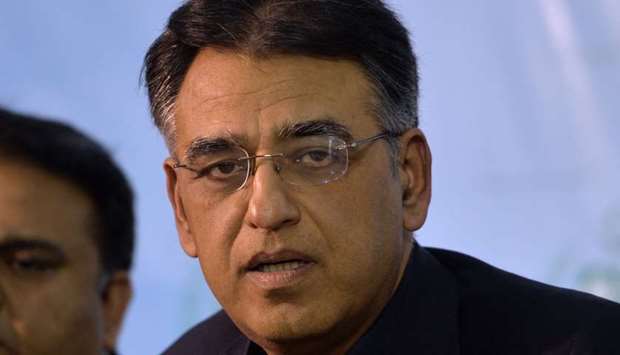In his first media encounter since resigning as Punjab food minister a day ago, Samiullah Chaudhry has claimed that Asad Umar, when he was federal finance minister, had asked for the export of wheat despite Chaudhry’s opposition.
Threatening to expose the forces involved in the wheat shortage conspiracy, Chaudhry said the inquiry committee had been reluctant to interview him during its investigation.
“Asad Umar as federal finance minister had chaired a high-level meeting in Islamabad early last year, and asked for exporting some of the wheat stocks, 7.2mn tonnes in Punjab at that time,” Chaudhry told a private TV channel. “I opposed the move because the government would have to offer subsidy for the export [for the grain being costlier than the world prices].”
“I said the country could not afford to give the subsidy and suggested rather selling out the same stocks in the local market [for the benefit of the local population],” he said, adding that flour mills in Islamabad and Khyber Pakhtunkhwa (KP) still enjoyed subsidised wheat at the cost of Punjab kitty, and he had asked the inquiry committee led by the director-general of the Federal Investigation Agency (FIA) to also include this fact in its report.
“Punjab is unfairly incurring the cost of the subsidy offered on the wheat supplied to Islamabad and KP mills. The beneficiaries must share the liability,” he added.
Chaudhry said that Punjab had procured 83% of the wheat produced last year, while no other province purchased a single grain [which led to the flour crisis later in 2019].
Terming the FIA report one-sided, he cast doubts about its purpose.
“It seemed the inquiry committee members were bent upon fixing responsibility, whether right or wrong, as the prime minister had given them the task to do it.”
The former Punjab minister claimed that the committee never summoned him and that he joined the investigation on his accord.
He alleged that the committee neither properly recorded his statement nor made the letters he had written to the department concerned part of the report.
About the allegation made in the report that as a minister he had failed to introduce reforms in his department, Chaudhry said that he did not join the provincial cabinet with reforms in the food department as his agenda.
He said he would first ask the FIA and the anti-corruption establishment authorities, who were part of the inquiry committee, how much reform they had introduced in their own agencies.
Moreover, he pointed out, when the secretary of the department is transferred four times in just one-and-a-half years, and without seeking opinion of the minister, how reforms could be introduced.
In response to Chaudhry’s claim, Umar, now minister for planning and development, said that it was not his personal but a collective decision taken on the condition that prices would not be allowed to be increased in the local market.
He explained that the decision was first taken by the Economic Co-ordination Committee and then endorsed by the federal cabinet.

Minister Umar: said that the decision to export wheat was not his personal decision, but a collective one taken on the condition that prices would not be allowed to be increased in the local market.
